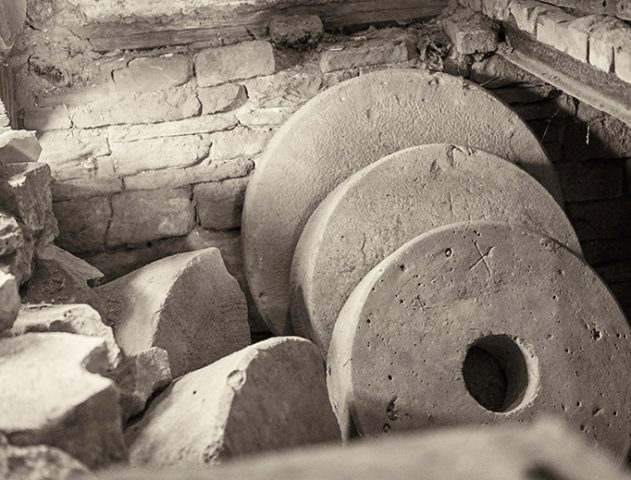E. Christian Brugger: Catholic Bishops and the Problem of Scandal

Prepare for the Wrath of the Pro-Abortion Militants
September 22, 2018
Fr. Mike Schmitz: When Mass Feels Like Going Through the Motions
September 22, 2018
millstones
Photo: Millstones
DIFFICULT MORAL QUESTIONS: In Catholic theology, scandal is leading another to do evil by word or example.
By E. Christian Brugger, EWTN, 9/19/18
Q. I’ve heard the term scandal used frequently during the present crisis: e.g., Archbishop Theodore McCarrick’s actions are “scandalous;” people are “scandalized” by the bishops’ inaction. But the term’s meaning is not always obvious to me. Could you please clarify the Catholic Church’s teaching on the sin of scandal?
A. In popular parlance, scandal often is used to refer to moral outrage. For example, a good priest might say, “The Catholic faithful are being scandalized by the conduct of their leaders.” Here, he is referring to the shock, anger and feelings of betrayal suffered by those who are surprised and disgusted to learn of their leaders’ complicity in wrongdoing.
But Catholic theology uses the term more precisely. Scandal is leading another to do evil by word or example.
Scandal is the great sin of churchmen in all ages, but especially in our day. So it is worth some concentrated attention.
Intentional vs. Unintentional Scandal
There are two types of scandal: intentional and unintentional. And I am morally responsible for both.
Intentional scandal is when I mean to lead another into sin. So an unchaste homosexual priest who seduces a seminarian not only sins by the sex acts he performs, but also — and even more gravely — by leading the seminarian into sin with him.
Unintentional scandal is much more common. It occurs when I say or do something that unintentionally leads another into sin.
This happens in two ways: when the scandal I cause proceeds from my own sinful actions; and when it proceeds from something that looks sinful, but isn’t, at least not in itself.
As an example of the first, think of a bishop who knowingly transfers a predator priest to a remote parish so he can “get a fresh start.” He doesn’t mean for the priest to do more evil, and even hopes he won’t; and he certainly doesn’t hope someone will see what he (the bishop) has done and be led astray.
Now the reassigning per se, although usually evil, is not scandalous to the predator priest, since it’s not the bishop’s example that prompts him to prey on boys; he has already resolved to do this.
To be sure, the reassigning is the cause of great evil inasmuch as it liberates the predator priest to continue his evildoing; but this isn’t ordinarily called scandal.
Rather, it is the sin of gross negligence, of cowardice and betrayal of episcopal responsibility, of dishonesty and wrongful tolerating of harm to innocent people, especially children; or any of a number of other grave sins.
But when the bishop’s act of shuffling predators becomes known, scandal may (and usually does) occur.
For example, someone who believes that Jesus is calling him to convert to the Catholic faith, but like Jonah is avoiding the call, may use the bishop’s example as a pretense — called a rationalization — for discarding the call. This indeed would be scandalous.
Also, when those who are indifferent to the faith are prompted by the bishop’s sin to become enemies of the faith, this is scandalous.
And when Catholics are prompted to stop going to the sacraments, to leave the Church for other Christian communions, or to cease tutoring their children in the faith, this too is scandalous.
Even when the bishop’s example prompts faithful Catholics to give over to sinful anger — not, mind you, the righteous anger that’s warranted — this also is scandalous.
Morally Ambiguous Examples
The second type of unintentional scandal — extremely widespread, but hardly acknowledged, in my experience, by most Church leaders — occurs when the example given by doing something that appears morally wrong but in itself is actually innocent causes another to sin.
For example, good bishops feeling somewhat paralyzed by the present crisis may choose not to speak out on behalf of salutary, but difficult, solutions. They might believe, and even rightly, that their superiors will not listen to them, or penalize them if they speak out, or, worse, demonize them for doing what likely will be construed as an act of “disloyalty” to the old-boys’ guild of bishops.
They see the way Cardinals Walter Brandmüller, Raymond Burke, Carlo Caffara and Joachim Meisner were treated when they respectfully but boldly submitted the five dubia to the Pope; and they’ve watched from afar as Archbishop Carlo Maria Viganò has been vilified by his enemies; and they say to themselves: “These are powerful clerics; I’m just a simple auxiliary or ordinary of a small diocese; nobody is going to listen to me.” So they don’t speak out.
This type of scandal is precisely what St. Paul addresses in his First Letter to the Corinthians. Many Christians in Corinth had come to the saving knowledge that since “there is no God but one,” all the idols of the pagans are false gods; and so these Christians felt free in conscience to eat all meat, even meat sacrificed to idols, without fear of committing idolatry.
But some of their brethren had what Paul calls a “weak conscience.” When they saw their stronger coreligionists eating meat sacrificed to idols, however innocently, it tempted them to fall into the sin of idolatry. The saving knowledge that leads the strong to do what’s otherwise innocent is precisely that through which “the weak person is brought to destruction.”
Paul says, therefore, addressing the Corinthians in the second person, that when you eat meat, “you sin in this way against your brothers and wound their consciences, weak as they are.” And when you do this, you are “sinning against Christ.”
Returning to the current crisis, the modern-day bishop’s choice not to speak out, like the ancient Christian’s choice to eat meat, may otherwise be innocent. But — and this is where scandal comes in — the choice to stay silent or offer worthless gestures of appeasement may tempt members of the Christian community to sin.
Seeing the silence, some are likely to interpret it as weakness, or cowardliness, or willingness to tolerate a culture of predation in the Church, or, worse, as a sign of secret agreement with the sinful clerical behavior and an episcopal culture of secrecy. Through the bishop’s ambiguous example, some Christians, especially those who are weak in faith or morals, may leave the Church and the sacraments, or become enemies of the Church — or worse, despair of their hope in Christ. In other words, through the bishop’s example, “the weak person is brought to destruction.”
We should attend carefully to the final words of St. Paul’s teaching (I replace “meat eating” with “staying silent”):
“Therefore, if staying silent causes my brother to sin, I will never stay silent again, so that I may not cause my brother to sin” (1 Corinthians 8:13).
What Should Bishops Do?
In my judgment, it is reasonable to conclude that giving scandal in this way is a lively possibility in every diocese of the United States.
A bishop who stays silent, or, worse, publishes insipid letters to be read at Sunday Mass that indicate no practical resolve to address what’s responsible for the crisis — promiscuous homosexuality, unchastity within the fraternity of priests and in seminaries, bishops not held accountable for gravely sinful behavior, clericalism and radical theological dissent against the authoritative moral teaching of the Church — gives scandal by tempting Catholics, most especially the victims of clerical predation and their loved ones (who constitute a fairly substantial population), to despair of the help of the Catholic Church in living the Christian life.
Each and every bishop therefore should — must — ask himself:
Do I have reason to believe that my action or inaction in response to the present crisis is likely to lead anyone around me, especially the morally and psychologically vulnerable, to sin seriously, especially by losing faith in the Catholic Church?
If the answer is Yes, then he has an obligation to act to obviate scandal. The obligation is grave since the matter is grave. The implications for mortal sin should be obvious.
This may sound like bishop-bashing, but it’s not. All of us have the grave duty to avoid giving scandal: Fathers who struggle with pornography mustavoid leading their sons and daughters into the same sin and tempting their wives to look elsewhere for marital-type consolation. Wives who struggle with gossip or vanity must be careful not to pass on sinful habits to their daughters or friends. Employers who lie or cook the books or backstab cause scandal by teaching subordinates to do the same.
Please, there are enough kinds of scandal to go around. All of us have responsibility. But in the present moment, the spotlight is on the bishops.
And let’s not forget Jesus’ warning about those who lead the little ones to stumble:
Whoever causes one of these little ones who believe in me to sin, it would be better for him to have a great millstone hung around his neck and to be drowned in the depths of the sea. Woe to the world because of things that cause sin! Such things must come, but woe to the one through whom they come! (Matthew 18:6-7)
Copyright © 2018 EWTN News, Inc. All rights reserved.
http://www.ncregister.com/blog/christianbrugger/catholic-bishops-and-the-problem-of-scandal




